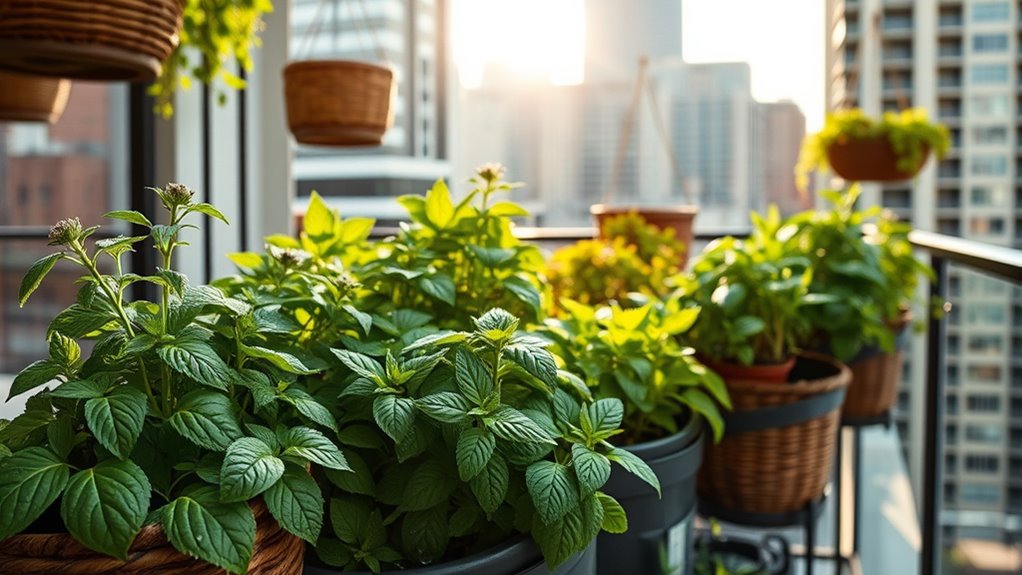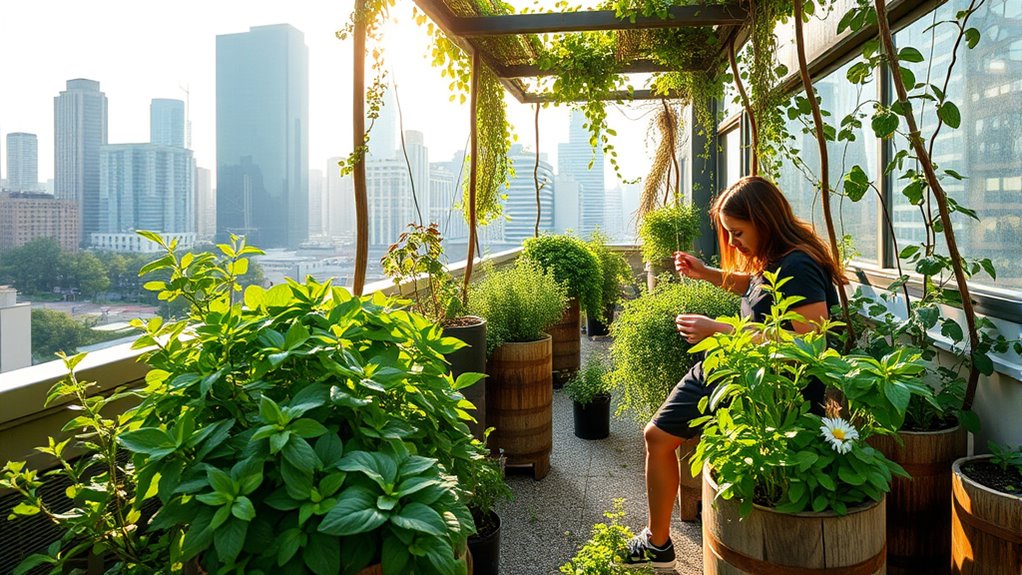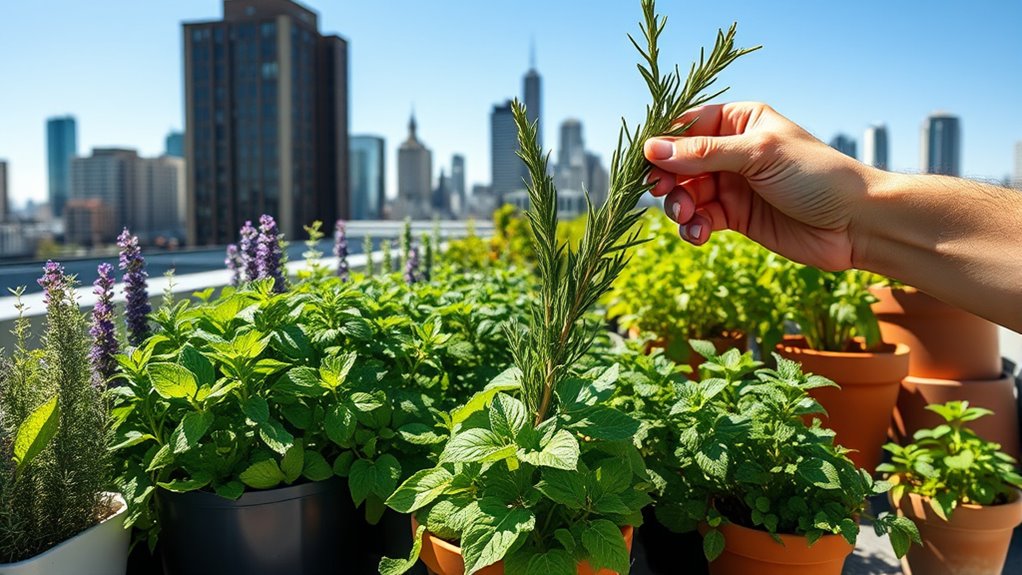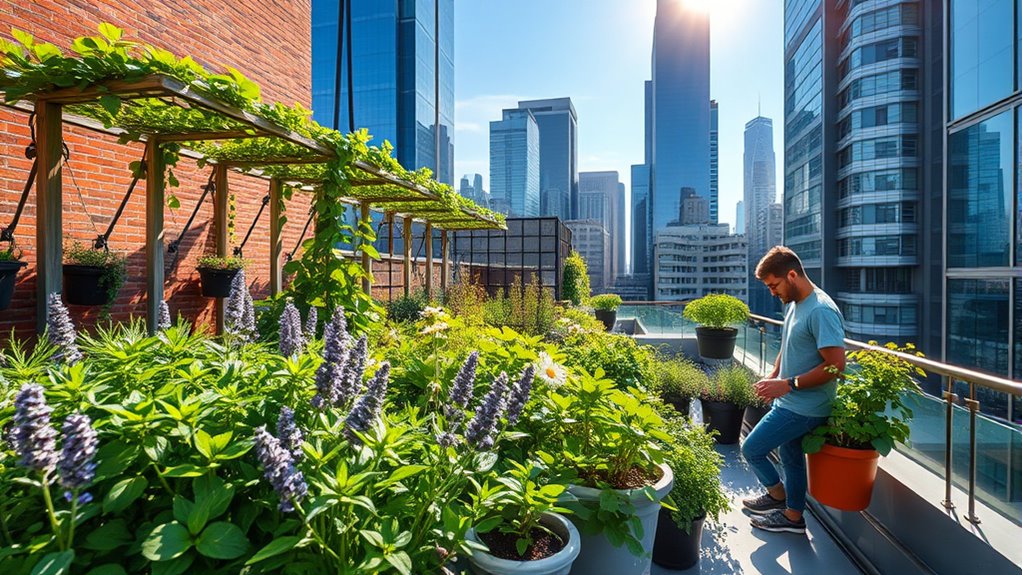Urban herbology lets you grow medicinal plants in small spaces like balconies and windowsills. Focus on compact herbs such as lavender, thyme, peppermint, and chamomile that thrive in containers and don’t need deep soil. Use sustainable practices like organic compost, rainwater, and native plants to make your garden eco-friendly. Proper harvesting guarantees potent remedies, while vertical planters maximize limited room. Keep exploring tips to create your urban wellness sanctuary with easy-to-care-for herbs.
Key Takeaways
- Choose compact, high-yield medicinal herbs like lavender, chamomile, and peppermint suitable for small containers and limited space.
- Ensure herbs receive 4-6 hours of direct sunlight daily and use well-draining soil for healthy growth.
- Practice sustainable methods such as organic composting, rainwater harvesting, and native plant selection to reduce environmental impact.
- Harvest herbs at peak growth, dry in dark, ventilated areas, and store properly to preserve medicinal potency.
- Maximize space with vertical gardens, hanging planters, and indoor grow lights to overcome urban space constraints.
Selecting the Best Medicinal Plants for Small Spaces

If you’re working with limited space, choosing the right medicinal plants is essential for a successful urban herb garden. Focus on compact varieties that thrive in small containers, like lavender, thyme, or oregano. These herbs are not only space-efficient but also have strong medicinal properties. Consider plants with high yield potential and easy maintenance, such as peppermint or chamomile, which can grow well in confined areas. Look for herbs that don’t require deep soil or extensive root space. Prioritize versatile plants that can be used in multiple remedies, ensuring you get maximum benefit from your limited area. Remember, selecting plants suited to your local climate improves their growth and medicinal potency, making your small space both functional and fruitful.
Tips for Growing Herbs on Balconies and Windowsills

Growing herbs on balconies and windowsills offers a convenient way to access fresh medicinal plants right at home. To make the most of your space, consider these tips:
- Choose compact, container-friendly herbs like thyme, basil, or mint that thrive in small pots.
- Guarantee your plants receive at least 4-6 hours of direct sunlight daily to promote healthy growth.
- Use well-draining soil to prevent root rot and keep your herbs happy.
- Position your containers where they won’t be disturbed by wind or animals, and rotate them regularly for even sunlight.
Sustainable Practices for Urban Herb Gardening

To maintain a thriving herb garden in urban spaces, adopting sustainable practices is key. Start by choosing organic soil and composting kitchen scraps to reduce waste and enrich your plants naturally. Use rainwater collection systems to water your herbs, conserving potable water and lowering your utility bills. Incorporate native plants, which require less water and are more resilient to pests. Practice companion planting to naturally deter pests and improve plant health without chemicals. Opt for biodegradable pots and eco-friendly fertilizers. Limit synthetic pesticides and herbicides, instead relying on natural remedies like neem oil or insecticidal soap. These practices not only protect the environment but also ensure your medicinal herbs remain pure and potent, making your urban garden more sustainable and beneficial in the long run.
Harvesting and Using Your Urban Medicinal Plants

Harvesting your urban medicinal herbs at the right time is essential to maximize their potency and health benefits. First, observe your plants’ growth stages: leaves should be vibrant and full, not wilted. Second, harvest in the morning after dew has dried for the strongest essential oils. Third, use clean, sharp scissors or shears to make precise cuts, avoiding damage. Fourth, collect only what you need, leaving enough plant material to continue growth. Once harvested, dry herbs in a well-ventilated, dark space or use a dehydrator. Store dried herbs in airtight containers away from light. When using, crush or chop leaves just before adding to teas, tinctures, or salves to preserve their medicinal properties. Proper harvesting guarantees you get the most from your urban garden’s bounty.
Overcoming Challenges in City Herb Cultivation

Urban herb cultivation presents unique hurdles, from limited space to unpredictable environmental conditions. You might struggle with finding enough sunlight or controlling soil quality in small containers. To overcome this, choose compact, container-friendly herbs like mint, basil, or thyme. Use vertical gardens or hanging planters to maximize space. Protect your plants from city pollution by placing them near air filters or on balconies away from heavy traffic. Regularly monitor soil moisture and provide proper drainage to prevent root rot. Consider using indoor grow lights for consistent illumination. Adapting to these challenges requires creativity and patience, but with smart planning, you can successfully cultivate medicinal herbs amidst the city’s chaos. Your persistence will reward you with fresh, healing plants right at your doorstep.
Frequently Asked Questions
How Can I Prevent Pests Without Harming My Urban Environment?
You can prevent pests in your urban garden by encouraging natural predators like ladybugs and lacewings. Use neem oil or insecticidal soaps as eco-friendly solutions, and avoid chemical pesticides that harm beneficial insects and your environment. Maintain plant health through proper watering and spacing, which reduces stress and pests. Regularly inspect your plants for early signs of trouble, and remove pests manually when possible to keep your garden safe and thriving.
What Are the Best Organic Fertilizers for City Herb Gardens?
For thriving city herb gardens, favor fun, fertilizer options like fish emulsion, compost tea, and worm castings. These organic choices provide powerful nutrients, promote healthy growth, and protect your plants naturally. You’ll find these fertilizers easy to apply, eco-friendly, and effective at feeding your herbs without chemical harm. Embrace eco-conscious methods that energize your urban oasis and guarantee your medicinal plants stay strong, sustainable, and superbly healthy.
How Do I Protect Plants From City Pollution and Dust?
You can safeguard your plants from city pollution and dust by creating barriers like fences or planting hedges to block wind-borne debris. Regularly wash leaves with water to remove dust and pollutants, helping them breathe better. Use breathable covers during heavy pollution days and make certain your plants are healthy with proper watering and fertilization. This proactive approach keeps your medicinal plants thriving despite urban challenges.
Can Medicinal Plants Be Grown Indoors Year-Round?
Yes, you can grow medicinal plants indoors year-round. Place them near a sunny window or use grow lights to guarantee they get enough light. Keep the temperature consistent and water them appropriately based on their needs. Use well-draining soil and avoid drafts or sudden temperature changes. Regularly check for pests and trim as needed. With proper care, your medicinal plants will thrive indoors throughout the year.
Are There Specific Plants Suited for Shady Urban Spots?
Yes, some medicinal plants thrive in shady urban spots. You should consider growing plants like lemon balm, pennyroyal, or comfrey, which tolerate low light conditions well. These plants are resilient and can adapt to shaded areas, providing you with fresh herbs for remedies. Make sure to water them regularly and use well-draining soil to keep them healthy and productive despite the limited sunlight.
Conclusion
By embracing urban herbology, you’ll transform tiny city spaces into powerful medicinal gardens—more vibrant than a rainforest! With the right plant choices, sustainable practices, and a bit of patience, you can harvest healing herbs right outside your door. Don’t let limited space hold you back; your green thumb has the potential to create a city oasis bursting with wellness. Start small, stay consistent, and watch your urban garden flourish into a sanctuary of health and vigor.










